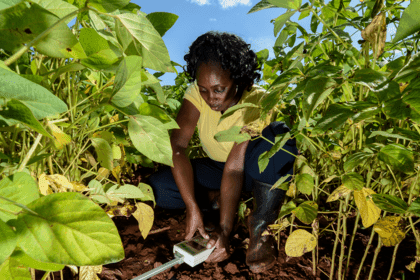
Learn why deforestation in DRC could release new viruses
How the lasting effects of colonisation, including the exploitation of natural resources, in the Democratic Republic of the Congo, could expose humanity to the next supervirus.
From food security to the spread of infectious diseases, our health is intertwined with the planet’s. We outline some of the damaging effects of climate change on health and why climate action cannot ignore the growing evidence.

Aniket Gawade / Climate Visuals Countdown
Damaging effects of changing rainfall patterns on corn crops in India

Director of Climate and Health, Wellcome

Director of Climate and Health, Wellcome
We’re funding vital research into the impact climate change has on human health around the world, at national, regional and global levels. Explore our current funding call:
Advancing climate mitigation solutions with health co-benefits in low- and middle-income countries
Climate change is responsible for over a third of heat-related deaths, and 295 billion hours of potential work were lost due to extreme heat exposure in 2020.
Heat-related illnesses like heat stroke, heat exhaustion and chronic kidney disease are also on the rise. And a growing body of evidence is highlighting the risks of extreme heat to maternal and neonatal health, mental health and chronic noncommunicable diseases, like asthma and diabetes.
Many of these health problems are not new, but they are often unequally distributed in societies and are made worse by climate change.
The most vulnerable communities in the poorest parts of the world are often those that are least able to adapt to climate change. Many are already experiencing the harmful effects of extreme heat.
In the Gambia for example, research shows that women farmers experience significant heat stress while working outdoors during pregnancy. Working with communities to find the most effective locally-relevant adaptations – such as completing the work in multiple shorter time increments or at different times of the day – will become increasingly important as global temperatures continue to rise.
Global heating also damages our health because of its impact on nature. For example, increasing temperatures, changing rainfall patterns and extreme weather affects the quantity and quality of food we can produce.
All over the world, staple crops like rice, wheat and soybean are getting harder to grow due to hotter temperatures and unpredictable rainfall patterns. And the evidence suggests that both the yield of these important food crops and their nutritional quality will fall dramatically. Changes in the availability and cost of basic foodstuffs, and declines in the diversity of diets, can quickly lead to increased rates of undernutrition, especially in young children.
If we don’t take urgent action to reduce greenhouse gas emissions, these events will get worse as the world continues to warm. This will reverse years of progress in tackling the food insecurity that still affects around two billion people globally.
Food production is also a major contributor to climate change. It is responsible for around a quarter of all global greenhouse gas emissions, most of which originate from meat and dairy livestock.
Reducing these emissions will be essential for building a healthy, sustainable future.
There is increasing evidence that some farming practices can offer innovative solutions that both reduce carbon emissions and improve food security. From diversifying crops to improving livestock management, these practices could address many of the challenges facing global food production.
Climate change is also a major factor in the emergence of diseases in new parts of the world, as well as the re-emergence of diseases that were previously under control.
Increased flooding can result in the ideal conditions for waterborne diseases, like cholera, to spread. While the destruction of natural habitats, such as old-growth forests, is increasing the risk of transmission of zoonotic diseases, like Ebola and Covid-19, that 'jump' from animals into humans.
Warm temperatures and wetter environments suit the lifecycles of many pathogens and vectors associated with newly emerging infectious diseases. These vector-borne pathogens pose an increasing risk to human health.

How the lasting effects of colonisation, including the exploitation of natural resources, in the Democratic Republic of the Congo, could expose humanity to the next supervirus.
Climate change is likely to be the greatest threat to human health this century and we need a global strategy for urgent action.
We must transition from our dependence on fossil fuels to significantly increase the use of clean and renewable sources of energy, such as solar and wind. It’s a big undertaking, with estimates suggesting around $9.2 trillion a year will be needed to reach net-zero emissions by 2050.
However, the cost of not acting will be far higher.
As heat-related mortality rises, crop yields fall and disease spreads, it is projected that by 2050 the effects of climate change could cause up to $23 trillion a year in reduced global economic output worldwide.
The more the global atmosphere warms, the more we will see the devastating (and expensive) health effects of climate change play out. From the cost of increasingly overburdened healthcare systems to the loss of earnings from reduced labour productivity, adapting to these changes will be far more costly than limiting them in the first place.
The sooner we act to mitigate the impacts of climate change, the better off we’ll be in the future.

Olive trees burn during a wildfire in Megara, Greece
Milos Bicanski / Climate Visuals Countdown
Through research, we can help people adapt to a rapidly changing world and protect their health.
We can use science to show the healthiest ways to reduce emissions, protecting lives and livelihoods. And we can help everyone understand how health is being affected by climate change to inspire more urgent action.
Governments and civil society must work together urgently to mitigate climate change and identify the best way to support vulnerable communities to adapt to its current and projected effects. We need to take action that is informed by robust evidence and tailored to the needs of specific regions, countries and communities.
Wellcome is working with people around the world, including those most affected by the effects of climate change, to support the use of evidence and science-based solutions in taking on this urgent health challenge.
This article was first published on 26 October 2021.


